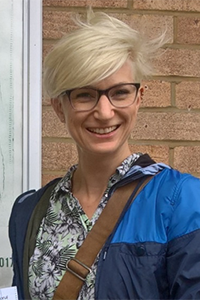- Our Students
- Alumni
- 2018
- Liz K Miller
Techne
Liz K Miller profile
Thesis
Sylvan Sounds: Exploring the Acoustic Forest through Visual Fine Art
About
Human-induced climate and ecological breakdown is radically changing the conditions of the surface of the earth, affecting the capacity for life to flourish. This thesis bears witness to that change, particularly within threatened forest landscapes. I aim to draw attention to the essential relationship between humans and trees by emphasising the magnificence, importance and vulnerability of the forest ecosystem.
I consider how listening to the sounds made by trees can reconnect humans to the forest, and how the combination of audio and visual can be used to enhance that connection. I use listening as a method for reengagement with the woodland environment and field recording to gather sounds of sylvan processes. I explore often inaudible and unnoticed sounds made by trees such as transpiration, decomposition and water saturation.
Study sites within UK forests have included: The Cairngorms National Park (Scotland), the Lake District (Cumbria), the Lizard Peninsula (Cornwall), Glen Affric (Scotland) with conservation group Trees for Life, and Blackheath Forest (Surrey) in partnership with Surrey Hills Arts.
Through sound visualisation I explore and analyse the field recordings in order to discover and reveal the hidden and unnoticed sonic depths of the sylvan forest. The resulting multi- sensory audio-visual artworks are used to direct attention and provide audiences with alternative avenues of engagement with, and perspective of trees, providing a catalyst for further dialogue regarding the importance of forests in the fragile time of the Anthropocene.
My work references contemporary theorists from the fields of ecological philosophy and audio theory – primarily the writings of Lispeth Lipari, Salomé Voegelin, Anna Lowenhaupt Tsing, Timothy Morton and Donna Haraway. By synthesising these theories with my own forest listening and sound visualisation practice, I argue for multi-modal listening as a method for generating alternative perspectives that move towards considering the forest not as an ecosystem service (for the use and exploitation by humans) but as a complex living multiplicity of interconnected life forms and resonating, vibrant processes, worthy of attention, celebration and auditory focus.
This research aims to make a timely, original contribution to understanding and awareness of our relationship to, and dependency upon, the sylvan environment. Given our expanding knowledge of climate breakdown, research such as this comes at a time when reconnecting humans with our non-human companion species – the trees – has never been more critical. I seek to bring the forest to the listener, and the listener to the forest, in order to start a dialogue about our perception of these environments, the benefits they bring us, and to consider our symbiotic futures.
